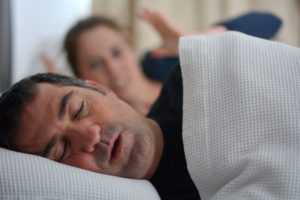
Sleep apnea is a condition that affects millions of Americans, leaving them devoid of the many benefits of receiving sufficient sleep. The most common form of the condition is obstructive sleep apnea (OSA). This is when there is a partial or full blockage of the airway that causes stoppages in breathing while resting. Does packing on extra pounds contribute to sleep apnea or vice versa? As you continue reading, a sleep dentist answers this question and explains the connection between weight gain and sleep apnea.
Which Comes First – Weight Gain or OSA?
Excessive weight gain can cause increased neck girth. This can add pressure and make the throat muscles flaccid while sleeping, resulting in an obstruction that causes stoppages in breathing. Common signs of this are loud snoring and gasping sounds while sleeping.
This isn’t a one-way street, though. Constantly interrupted sleep is one of the leading causes of obesity. It disrupts the body’s circadian rhythm (its internal clock) and hormonal balance, which can cause unusual food cravings, inflammation and slower metabolism. Lack of sleep can also deplete energy stores. That means people who suffer from OSA are less likely to exercise, which is one of the best ways to control weight.
How to Fight Back
It should be noted that losing weight is not a way to completely cure sleep apnea, but it can make a significant impact. Studies show that losing just 10-15% of one’s current weight can reduce the severity of OSA by 50%. Dietary and exercise changes can also help to reduce blood pressure, improve cardiovascular health and make the body more insulin responsive.
How a Sleep Dentist Can Help
Receiving treatment for OSA starts with identifying the problem. If you’ve noticed any of the following symptoms, bring it to your primary physician’s attention so you can take a sleep test:
- Loud, chronic snoring
- Gasping for air or waking up feeling out of breath
- Morning headaches
- Sore throat or dry mouth in the morning
- Severe daytime lethargy
- Difficulty focusing or remembering things
- Mood swings
- Sexual dysfunction
- High blood pressure
If you’re diagnosed with OSA, a sleep dentist can provide the treatment you need. The most common method involves a CPAP (continuous positive airway pressure) machine, which is a mask that is worn while sleeping that pumps air into your throat. Many patients find this to be loud, uncomfortable and cumbersome. Thankfully, there is an alternative: a custom oral appliance. It’s designed to shift the jaw slightly forward to allow for better airflow, more comfortability and an uninterrupted night of rest.
If you suspect that you’re dealing with sleep apnea in Columbus, don’t hesitate to seek help. With the right lifestyle changes and professional treatment, you can gain the balance and total wellness you need.
About the Author
Dr. Eric Buck is a graduate of The Ohio State University College of Dentistry. As part of his commitment to providing effective and competent care, he maintains professional affiliation with the American Academy of Dental Sleep Medicine and other organizations. Dr. Buck helps his patients rest better by treating sleep apnea at The Columbus Sleep Center, and he can be reached for more information or to schedule a visit through his website.
